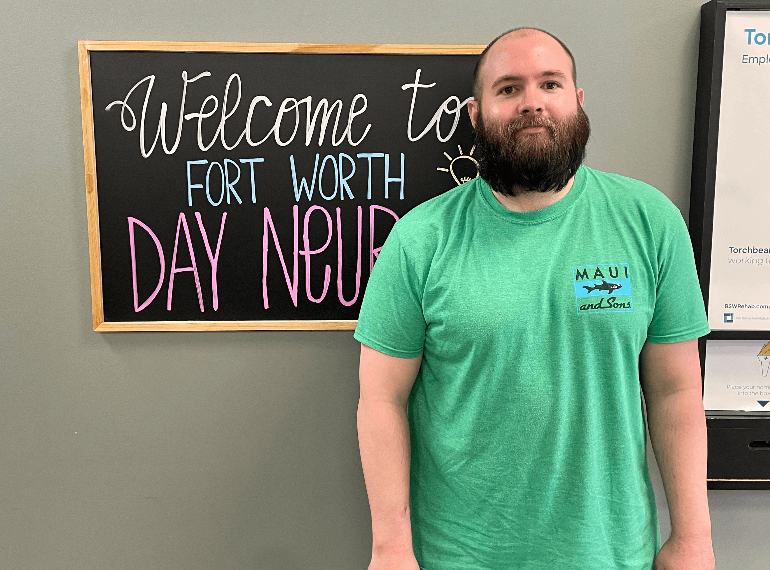Chris' Story

COVID-19
“I’ve always been healthy and don’t typically get sick,” said Chris Fields, a 36-year-old detective with the Fort Worth Police Department. “So I almost knew right away it was COVID.” After returning from work, Chris realized he had a fever, and, as predicted, a COVID-19 test came back positive. After a few days of fever and an achy body, Chris thought he had beaten it.
“I never really had a cough or difficulty breathing,” he recalled. “I was just really fatigued.” After more than a week, though, his mom used a pulse oximeter and discovered that his oxygen levels were below 90%. His parents convinced him to go to the hospital, where staff admitted him for observation.
That was when everything fell apart. “I had a cytokine storm,” Chris said. This “storm” meant that his immune system was attacking his own cells—his lung cells. His health cascaded downhill until doctors had no choice but to put him on a ventilator and into a medically induced coma.
“At one point, they called my mom in the middle of the night and said they didn’t anticipate me surviving into the morning,” Chris said. Doctors told his parents that even if he survived, he would be cognitively impaired and likely require a lung transplant.
But Chris beat the odds. After a month in a coma, Chris was liberated from the ventilator.
“After I woke up, I had so much scarring and damage in my lungs that they didn’t know what my future would look like,” he said. Besides the lung damage, Chris couldn’t move his arms or legs. He had no stamina and couldn’t tolerate even small amounts of activity. His body was profoundly weak and his left leg had atrophied below the knee to the point where he had no feeling or control over it.
Chris had a tough road ahead of him, and he would need expert-level rehabilitative care to regain his independence and get back to work. He decided to go to Baylor Scott & White Institute for Rehabilitation (BSWIR) – Fort Worth. “My parents had always heard good things about Baylor. The Day Neuro program was recommended to us for COVID recovery as well,” he said.
The rehab team at BSWIR – Fort Worth developed a treatment plan that would challenge Chris with imaginative physical and occupational therapy. “They’ve cooked up a whole bunch of stuff for me here,” Chris said. “The treadmill and bike and weightlifting were great for my endurance. They’ve been really creative at challenging my strength and balance by setting up balance courses, battle ropes and the like.” Chris didn’t mind the challenge. He wanted to “get back to the way I was before, no matter how much work I had to put in,” he said.
After successful inpatient rehabilitation, Chris transitioned to the BSWIR – Fort Worth Day Neuro program. The Day Neuro program is a comprehensive outpatient program that provides focused rehabilitation for people who have had a stroke, a brain injury or other neurological disorders.
Now well along on his journey, Chris praised the support of his parents. “They’ve been instrumental. Both of my parents have been involved and supportive from the get go,” he said. The support of his parents, his determination and the creativity of his therapy team culminated in real progress for Chris. He recalled the moment he knew he had turned a corner in his recovery. “The first time I was able to walk all the way around the block of my parents’ house with my AFOs (ankle foot orthosis). It’s about a mile and a half and hilly. I knew then I was headed in the right direction,” he said.
Inspired to continue his hard work, Chris continued to improve. “I have 75% lung capacity now. I can do everything on my own that I need to, like cooking, laundry and yard work,” he said.
Chris is now looking forward to the next step of his journey. “Hopefully, one day, I’ll be able to walk back in here and say hello to everyone. I’m looking forward to getting my life back, getting back to work and getting back to me again.”
“I’ve enjoyed the people here,” Chris said of his time at BSWIR – Fort Worth. “Everyone is helpful, supportive and friendly. Even the other patients, we all band together and help each other out.”
Chris had some advice for people facing the same challenges that he had. “You just have to keep pushing forward,” he exclaimed. “No one knows what tomorrow has for you, but as long as you keep pushing forward, good things will happen.”